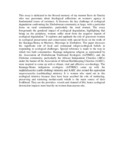Please use this identifier to cite or link to this item:
https://cris.library.msu.ac.zw//handle/11408/1417| Title: | Karanga-Shona Rural Women's Agency in Dressing Mother Earth: a contribution towards an indigenous eco-feminist theology | Authors: | Chirongoma, Sophia | Keywords: | Indigenous eco-feminist theology. | Issue Date: | Mar-2012 | Series/Report no.: | Journal of Theology for Southern .Africa;No.142; p.120-144. | Abstract: | This essay is dedicated to the blessed memory of my mentor Steve de Gruchy who was passionate about theological reflections on women's agency in fundamental issues of existence. It discusses the key challenge of ecological degradation confronting the Zimbabwean community at large, with a particular focus on rural communities, particularly the rural women. The essay foregrounds the gendered impact of ecological degradation, highlighting that being on the periphery, women suffer most from the negative impact of ecological degradation." It explores and applauds the role of grassroots women in ecological preservation and conservation with special focus on the work of the Karanga-Shona in Murinve, Masvingo in Zimbabwe. The paper discusses the significant role of local and communal religio-ecological beliefs in responding to ecological challenges. Special reference is made to the way in which two faith communities. Karanga indigenous religion as represented by the Association of Zimbabwean Traditional Ecologists (AZTREC), and the Christian community, particularly the African Independent Churches (AICs) under the banner of the Association of African Earthkeeping Churches (AAEC), were inspired to come up with a vibrant, vital and effective eco-theology. The Karanga-Shona indigenous ecologists (AZTREC) came up with the mafukidzanyika (earth-clothing) ministry and AAEC also coined the equivalent maporesanyika (earthhealing) ministry. It is women who stand out in this ecological ministry because they have been ascribed the role of mothering, preserving and nurturing mother-earth which is the main source of their livelihood. They are the providers. vessels and channel of life, hence ecological destruction impacts more heavily on women than anyone else. | URI: | http://hdl.handle.net/11408/1417 |
| Appears in Collections: | Research Papers |
Files in This Item:
| File | Description | Size | Format | |
|---|---|---|---|---|
| Karanga-Shona.pdf | Abstract | 20.16 kB | Adobe PDF |  View/Open |
Page view(s)
86
checked on Apr 27, 2025
Download(s)
26
checked on Apr 27, 2025
Google ScholarTM
Check
Items in MSUIR are protected by copyright, with all rights reserved, unless otherwise indicated.



